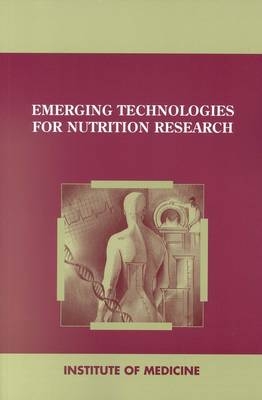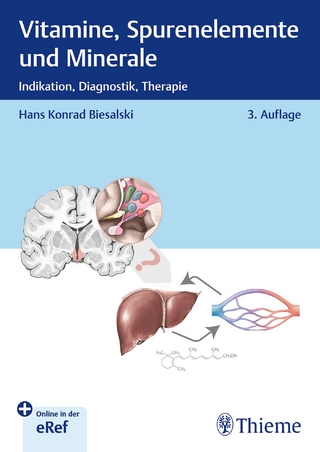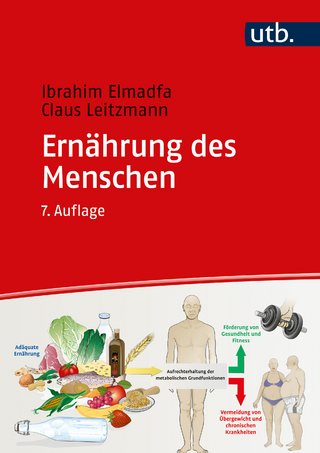
Emerging Technologies for Nutrition Research
National Academies Press (Verlag)
978-0-309-05797-4 (ISBN)
- Keine Verlagsinformationen verfügbar
- Artikel merken
The latest of a series of publications based on workshops sponsored by the Committee on Military Nutrition Research, this book's focus on emerging technologies for nutrition research arose from a concern among scientists at the U.S. Army Research Institute of Environmental Medicine that traditional nutrition research, using standard techniques, centered more on complex issues of the maintenance or enhancement of performance, and might not be sufficiently substantive either to measure changes in performance or to predict the effects on performance of stresses soldiers commonly experience in operational environments. The committee's task was to identify and evaluate new technologies to determine whether they could help resolve important issues in military nutrition research. The book contains the committee's summary and recommendations as well as individually authored chapters based on presentations at a 1995 workshop. Other chapters cover techniques of body composition assessment, tracer techniques for the study of metabolism, ambulatory techniques for the determination of energy expenditure, molecular and cellular approaches to nutrition, the assessment of immune function, and functional and behavioral measures of nutritional status.
Table of Contents
Front Matter
I Committee Summary and Recommendations
1 Project Overview and Committee Summary
2 Committee Responses to Questions, Conclusions and Recommendations
II The Current Army Program and Its Future Needs
3 Emerging Technologies in Nutrition Research for the Military:
Overview of the Issues
III Techniques of Body Composition Assessment
4 Military Application of Body Composition Assessment Technologies
5 Imaging Techniques of Body Composition: Advantages of Measurement
and New Uses
6 Dual-Energy X-Ray Absorptiometry: Research Issues, and Equipment
7 Bioelectrical Impedance: A History, Research Issues, and Recent
Consensus
Part III Discussion
IV Tracer Techniques for the Study of Metabolism
8 Stable Isotope Tracers: Technological Tools That Have Emerged
9 Measurement of Energy Substrate Metabolism Using Stable Isotopes
10 Combined Stable Isotope-Positron Emission Tomography for In Vivo
Assessment of Protein Metabolism
11 Nuclear Magnetic Resonance Studies of Liver and Muscle Glycogen
Metabolism in Humans
Part IV Discussion
V Ambulatory Techniques for Measurement of Energy Expenditure
12 Doubly Labeled Water for Energy Expenditure
13 Measurement of Oxygen Uptake with Portable Equipment
14 Advances in Ambulatory Monitoring: Using Foot Contact Time to
Estimate the Metabolic Cost of Locomotion
15 Noninvasive Measurement of Plasma Metabolites Using
Near-Infrared Spectroscopy
Part V Discussion
VI Molecular and Cellular Approaches to Nutrition
16 The Role of Metals in Gene Expression
17 Metabolic Regulation of Gene Expression
18 Use of Isolated-Cell and Metabolic Techniques Applied to Vitamin
Transport and Disposition
19 Assessment of Cellular Dysfunction During Physiologic Stress
VII Assessment of Immune Function
20 The Validity of Blood and Urinary Cytokine Measurements for
Detecting the Presence of Inflammation
21 New Approaches to the Study of Abnormal Immune Function
Part VI and VII Discussion
VIII Functional and Behavioral Measures of Nutritional Status
23 Involuntary Muscle Contraction to Assess Nutritional Status
24 Application of Cognitive Performance Assessment Technology to
Military Nutrition Research
25 New Techniques for Assessment of Mental Performance in the Field
26 The Iowa Driving Simulator: Using Simulation for Human
Performance Measurement
Part VIII Discussion
Appendixes
Appendix A: Workshop Agenda
Appendix B: Biographical Sketches
Appendix C: Abbreviations
Appendix D: Emerging Technologies for Nutrition Research - A
Selected Biography
Index
Committee on Military Nutrition Research, Institute of Medicine
1 Front Matter; 2 I Committee Summary and Recommendations; 3 1 Project Overview and Committee Summary; 4 2 Committee Responses to Questions, Conclusions and Recommendations; 5 II The Current Army Program and Its Future Needs; 6 3 Emerging Technologies in Nutrition Research for the Military: Overview of the Issues; 7 III Techniques of Body Composition Assessment; 8 4 Military Application of Body Composition Assessment Technologies; 9 5 Imaging Techniques of Body Composition: Advantages of Measurement and New Uses; 10 6 Dual-Energy X-Ray Absorptiometry: Research Issues, and Equipment; 11 7 Bioelectrical Impedance: A History, Research Issues, and Recent Consensus; 12 Part III Discussion; 13 IV Tracer Techniques for the Study of Metabolism; 14 8 Stable Isotope Tracers: Technological Tools That Have Emerged; 15 9 Measurement of Energy Substrate Metabolism Using Stable Isotopes; 16 10 Combined Stable Isotope-Positron Emission Tomography for In Vivo Assessment of Protein Metabolism; 17 11 Nuclear Magnetic Resonance Studies of Liver and Muscle Glycogen Metabolism in Humans; 18 Part IV Discussion; 19 V Ambulatory Techniques for Measurement of Energy Expenditure; 20 12 Doubly Labeled Water for Energy Expenditure; 21 13 Measurement of Oxygen Uptake with Portable Equipment; 22 14 Advances in Ambulatory Monitoring: Using Foot Contact Time to Estimate the Metabolic Cost of Locomotion; 23 15 Noninvasive Measurement of Plasma Metabolites Using Near-Infrared Spectroscopy; 24 Part V Discussion; 25 VI Molecular and Cellular Approaches to Nutrition; 26 16 The Role of Metals in Gene Expression; 27 17 Metabolic Regulation of Gene Expression; 28 18 Use of Isolated-Cell and Metabolic Techniques Applied to Vitamin Transport and Disposition; 29 19 Assessment of Cellular Dysfunction During Physiologic Stress; 30 VII Assessment of Immune Function; 31 20 The Validity of Blood and Urinary Cytokine Measurements for Detecting the Presence of Inflammation; 32 21 New Approaches to the Study of Abnormal Immune Function; 33 Part VI and VII Discussion; 34 VIII Functional and Behavioral Measures of Nutritional Status; 35 23 Involuntary Muscle Contraction to Assess Nutritional Status; 36 24 Application of Cognitive Performance Assessment Technology to Military Nutrition Research; 37 25 New Techniques for Assessment of Mental Performance in the Field; 38 26 The Iowa Driving Simulator: Using Simulation for Human Performance Measurement; 39 Part VIII Discussion; 40 Appendixes; 41 Appendix A: Workshop Agenda; 42 Appendix B: Biographical Sketches; 43 Appendix C: Abbreviations; 44 Appendix D: Emerging Technologies for Nutrition Research - A Selected Biography; 45 Index
| Erscheint lt. Verlag | 3.10.1997 |
|---|---|
| Verlagsort | Washington |
| Sprache | englisch |
| Maße | 152 x 229 mm |
| Themenwelt | Medizin / Pharmazie ► Gesundheitsfachberufe ► Diätassistenz / Ernährungsberatung |
| Sozialwissenschaften ► Politik / Verwaltung | |
| ISBN-10 | 0-309-05797-3 / 0309057973 |
| ISBN-13 | 978-0-309-05797-4 / 9780309057974 |
| Zustand | Neuware |
| Haben Sie eine Frage zum Produkt? |
aus dem Bereich


